CYCLING ACROSS AFRICA AFTER A DEGREE IN DEVELOPMENT, PART 2
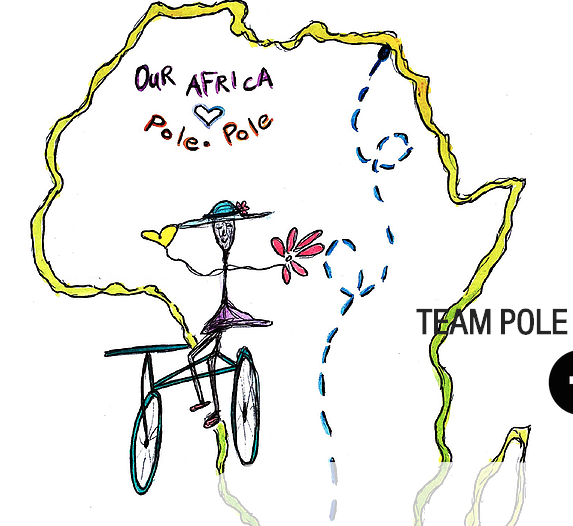
CYCLING ACROSS AFRICA AFTER A DEGREE IN DEVELOPMENT, PART 2
South African and Oxford alumna Michelle Rorich (St Antony's, 2017) puts theory into practice with an epic bike ride
Published: 18 November 2019
Author: Michelle Rorich
Share this article
We then crossed Lake Nasser on a ferry to arrive in Sudan. We had high expectations for this nation. Over iced coffee on a rare summer’s day on Banbury road, Sudanese Abdelrahman had told me that we’d only have one problem in Sudan. Too many people would invite us for food and rest. We did all put on weight in Sudan, but otherwise this problem only brought us joy (and once a bit of confusion as two families tried to host us one small town). All the way from Wadi Halfa, where fisherman fed us their fresh catch and played us their music, to where we left Sudan for Ethiopia, people called us in for food and rest in their lovely clay homes.
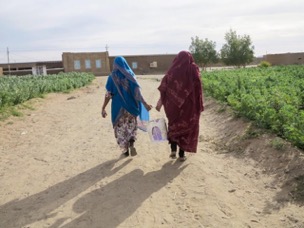
Two of our many kind hosts in Sudan, also sisters, back from showing us their fava bean farm
Abdelrahman, a medical doctor and public policy graduate from Oxford, was out of the country when we arrived in Khartoum. He was busy with his work for an NGO that works to improve Sudanese policy, as a response to the governance challenges facing Sudan. Still, he phoned his family in Khartoum who welcomed me in for a week as I recovered from a lingering cold, spoiling me with their superb cooking and a quiet airconditioned space.
Abdelrahman’s father is a minister of health and kindly took me along to work one day. His colleagues patiently answered my questions and told me passionately of their successes in health care around the country. In the midst of political crisis, they are getting on with their good work. A family of health professionals, Abdelrahman’s sister introduced us to two exceptional medical students who are also women’s rights activists. We were privileged to spend an evening with two role model African youths – putting all their energy into making positive change for what they believe in. We left inspired by their ability to maintain the beauty of feminine gentleness while drawing on the depth of strength that all African women possess to activate changes in gender norms.
It was now March and Ethiopia was next. Addis Ababa was a destination for a rest stop, thanks to a wonderful friend from the MSC at Oxford, Emily Chai. The rest was needed after climbing from low and flat Sudan to the Ethiopian highlands. The landscape change brings greenery, mountain views and the best food we’d tasted thus far. A very strong culture, as well. It’s been kept alive by proud and brave Ethiopian who developed a state in 100 AD and maintained independence since then. We were spoilt with incense-clouded coffee ceremonies every day – a perfect 9am break from the saddle. Between sensory experiences of coffee ceremonies and spicy njera, a sourdough-risen flatbread, we experienced moments of utter appreciation for the children who ran behind us, pushing us up the hills our legs were too tired to push up on their own. The last hill up into Addis brought a glorious rain storm. We danced to keep warm with a restaurant owner under her tin roof where we’d parked the bikes to let the rain pass. We then descended into Addis where Emily welcomed us in to her home. She’d quit her corporate work to do something more meaningful and in line with her development studies. I have no doubt she is adding exceptional meaning to the Agricultural Transformation Agency where she works. Showing us around the quiet office where her colleagues were working hard on their desktops, she told us that this unit is renowned as the most efficient government operation in Ethiopia. And she is a senior project leader there. Go Em!
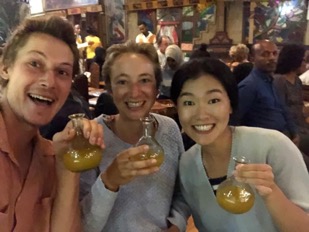
Cheers to the MSC class from Addis...
We delayed our departure from Addis when a shopkeeper we had come to know invited us to stay for the big Easter feast. Fully rested, we got on our bicycles and descended further down the escarpment and into the land Bantu people had migrated to and established themselves in three or four thousand years ago. We were welcomed to Kenya with steaming hot Ugali and Nyama (maize meal and meat) and the open happiness we are familiar with from the bantu people of South Africa.
A few months later, passing through Uganda and Tanzania, we found ourselves in Kenya’s capital, Nairobi. Two friends from the Standard Bank Chairman’s scholarship, Titus and Michael, both studied Finance and Law at Oxford and hail from this region. Titus has just started a legal practice in Nairobi and gave us the grand tour of Nairobi’s CBD and shared his excitement of new initiatives to encourage finance to flow to sustainable investment through the Kenyan central bank. Michael is working hard as a Lawyer in London but sent his best friend, Eric, to pick us up and take us on the four-hour car ride to the village they grew up in.
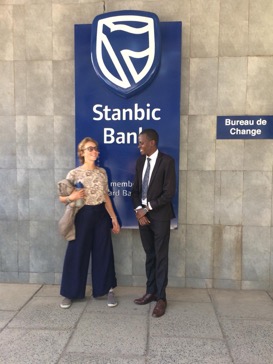
Titus and I taking a photo for the Standard Bank scholars in Nairobi
Michael’s old school is just like most others in Kenya. Not much more than desks, chairs and black boards. But it is beautifully situated overlooking the dry African landscape and the head teacher is making every effort to improve learning outcomes at the school. He proudly gestured to the charts on his office wall indicating the improvement in performance over the last few years. The years since he received the position. It used to be run by a missionary. It was a very good school back then, Eric tells us. But they left and so did the funding to keep the school in shape. The head teacher said we should greet the children issued instructions to gather them. They looked up at us, and us back at the sea of bright young bodies in their neat green uniforms. We were introduced as Michael and Eric’s friends, the two most disciplined pupils in their day. “That is why they are so successful now,” he says. Eric and the head teacher had a brief chat about starting an old boys club – an initiative to assist the school where possible with much needed resources. Then it was time to head home for lunch. Walking barefoot, as Eric said Michael had every day, we wound our way along a narrow footpath. We passed the giant fig tree that the two friends used to swing in after school. Passed the small mud brick houses where their neighbours lived and to the front door of a pale blue house where Michael’s mum wrapped us in her arms. She led us to her living room where a feast of traditional Kenyan food was waiting for us. Much of the produce was from her own garden. We video called Michael in his office in London. Afterwards, Michael said that it was the first time he’d been to chat to his mum on video from London. This is something Robbie and had been taking for granted as we show mum our happy faces and the scenery around us.
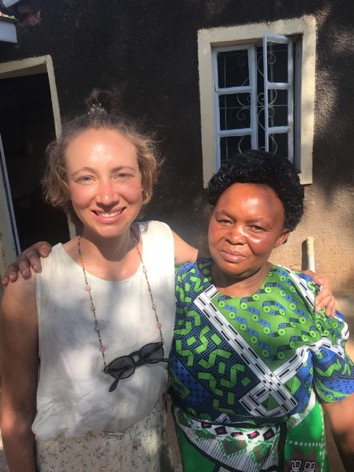
Michael's mum and I
Two days later we cycled South East out of Nairobi, downhill but into the wind. We were lucky to be in the company of Tilman Graff, a friend from the rowing club at St Antony’s. A brilliant economics graduate, he is doing research on the interesting dynamics of cash grants in Kenya. It was a treat to cycle alongside him and hear his insights on the great potential cash grants have to empower people. We all spent the night on a classroom floor of a secondary school, kindly hosted and fed by the head teacher. We parted in the morning – us towards the Eastern Coastline and Tilman back to Nairobi.
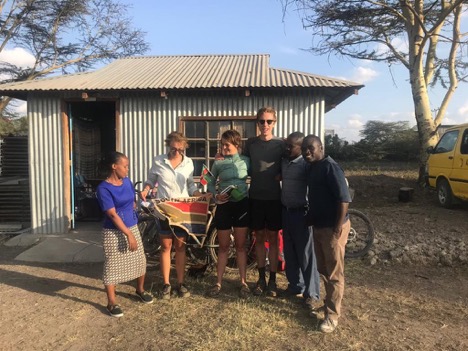
Tilman, Suzanne and I with the school teachers hosting us for the night
As we neared the coast, we began to see the colourful veils of the Digo women. The Young boys running beneath the mango in their long white robes. The food becomes spicier. The Islamic influence originates from around 100AD as the locals established trade relations with Arabic people. The green leaved baobabs and coconut trees heavy with fruit piqued our excitement to reach the coast. And it was a real joy diving into the turquoise waves for the first time on Diani beach. We headed South from there and crossed the border into Tanzania where we met family and friends on Zanzibar for a half-way break from cycle touring. This is where Adam, another MSC classmate is doing his ODI fellowship. We had a wonderful catch up with him and heard about the interesting dynamics of the education ministry where he is doing his ODI fellowship. Zanzibar is aesthetically idyllic but marred with an ugly history as we saw visiting the Old Slave Market Museum. I think of the grandeur of the buildings in Oxford, built on unrecognised sweat of enslaved Africans. We chat about the unrecognised work of the Africans today. Those who keep the continent alive, with sweat and love for their families – in the fields, over the cooking pots, in the classrooms. Our recognition – congratulations from so many people we meet – for having a good time cycling down the continent seems so silly.
We missed Desmond Mushi in Dar es Salaam, a pity as it would have been a great privilege to be shown around by the founder of the African Economist and Masters graduate of Public Policy at Oxford. We cycled West, the sun setting a little later each day as we moved from the heat of the lowlands to cool temperatures in the mountains that flank Lake Malawi. Off the main road we did some of the most beautiful cycling on the continent. Often just us. Luckily it was beautiful and we met some friendly farmers along the way to buy food from because we could hardly manage more than 30km a day – walking both up and down some of the steep hills. And then, one day, the mountains gave way to a magical scene – the orange sun, low in the sky illuminating the great Lake Malawi, complete with the tranquil dugout fishing boats returning home after a long day out.
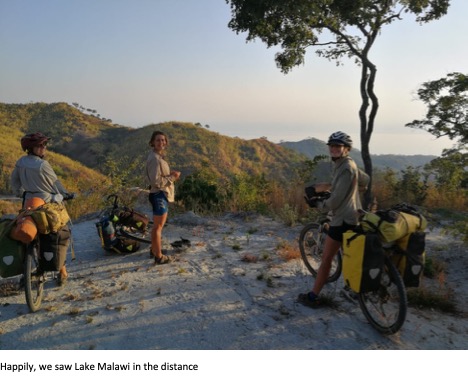
Happily, we could then see Lake Malawi in the far distance
Malawi is known as the warm heart of Africa and the wonderful people living there are certainly the reason. The high population density, intensified by the migration from surrounding less stable countries, makes life difficult. Charcoal is often the only way to cook food and for those who make it, to earn a meagre income. The once forested land looks barren. There is a sense of hopelessness and severe hardship as we travel through rural areas. As everywhere where one finds despair, there are also creative, enthusiastic people instilling hope. Permaculture (a sustainable agricultural method) is the channel for passion for change. A friend of a friend invited me to a permaculture WhatsApp group for Malawians active in spreading the practice. The group is incredibly active with pictures of training events, advice on which natural pesticides and fertilizers work best and complete enthusiasm for sustainable development in Malawi. There is still much frustration with the government for not doing more and we were in Lilongwe as protests were breaking out. Katerina Kuske, a classmate of Tilman in the Economic Department is completing her ODI fellowship in Lilongwe. With the same passion for development as the permaculture group, she shared her frustration at the efforts of the government to meet their people’s needs over an Ethiopian meal in the lovely suburbs of Lilongwe.
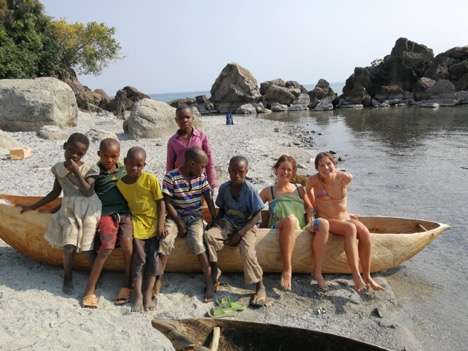
Lake Malawi
Now we are about to cross the border into Zimbabwe. We are almost home. We have seen so much and learnt so much – yet I feel I still know so little. What I do know for sure is that Africa is bursting with potential. I am part of a generation with greater qualifications than ever before. With worldly understandings and access to global knowledge. Yet, still, a deep connection with fellow Africans who haven’t had this privilege – and great will to be part of the energy that will shape the future of this magnificent continent. The journey has strengthened my belief in the innate goodness of people. It has also been a big lesson about privilege. Privilege on so many levels – being able to take time, to travel, having white skin in post-colonial Africa, having connections at Oxford – but most importantly, being able to firmly believe that life truly is a beautiful gift.
Dubbed ‘Team Pole Pole’, see the website of Michelle and her fellow cyclists.
Launched in 2017, the Oxford Black Alumni Network connects hundreds of black Oxford graduates with peers from across the generations. Through these connections and sharing their achievements, the platform allows them to be power players in the University’s legacy, future, and access to higher education in general. For current and aspiring Oxford students, their experiences are an encouraging appeal to dream bigger, achieve their goals and follow in their footsteps.
South African Michelle Rorich (St Antony’s, 2017) graduated in 2018 with an MSC in Economics for Development. She says, ‘I left Oxford eager to learn more about development from a grassroots perspective and so decided to spend the year travelling from Cairo to Cape Town (home) to better understand what development means to the people we would meet along the way.’ At the point of publication in November 2019, she was still cycling with four other South Africans, but in the New Year she will aim to write up the trip in a publication and pursue a career linked to sustainable agriculture in Africa.















